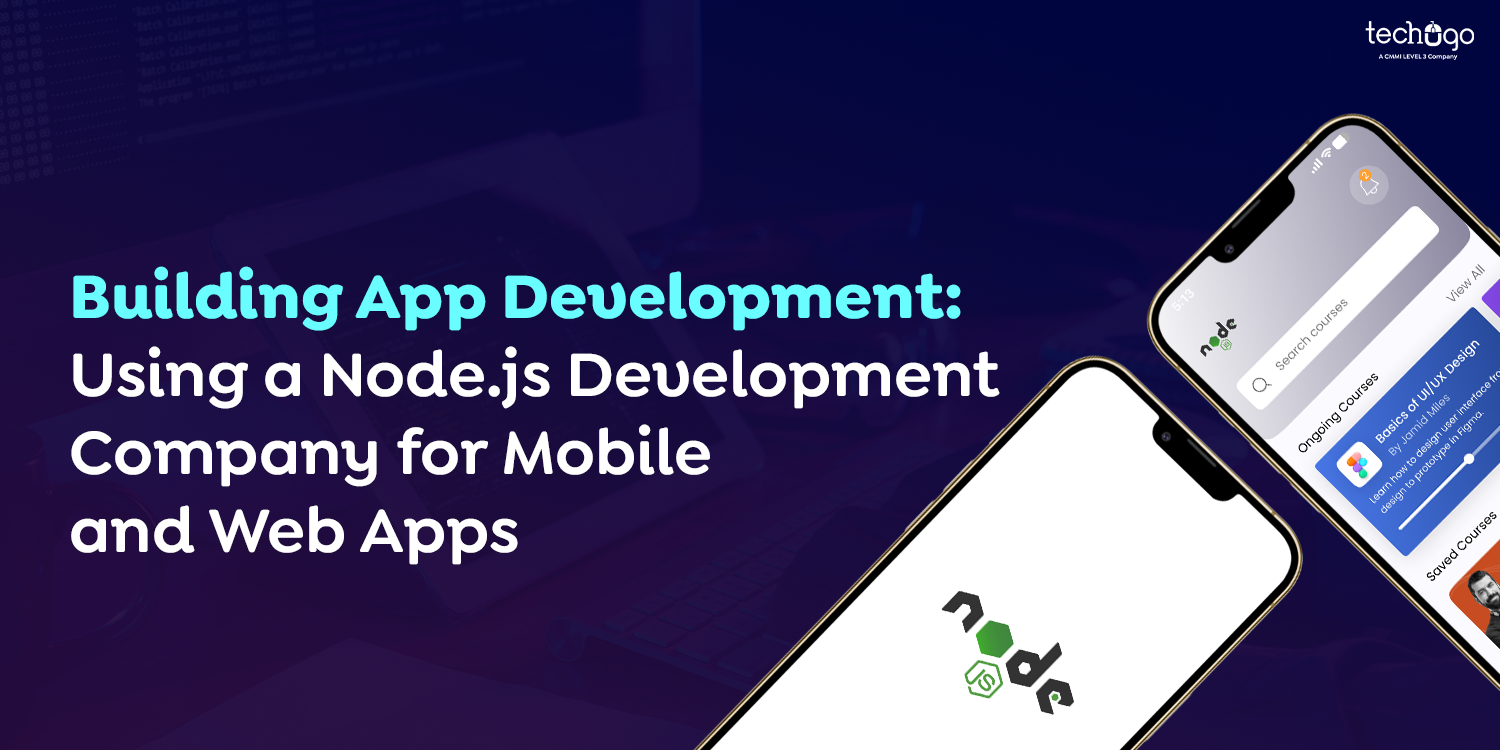17 Oct 2023
Updated on January 29th, 2025
The Future of App Development: Why Choose Node.js for Mobile & Web
Matthew Connor

In the present day, a rising number of startups, businesses, and other companies are producing apps because they recognize that more consumers are utilizing software to consume information and entertainment and access data and services. The appropriate app may help your company engage with customers, offer services more efficiently, and enhance your brand. However, it would be best if you first designed an app strategy before constructing an app. Choosing the best app platform is a critical step in the app development process.
Mobile App vs. Web App
You can choose between a mobile app and a web app as a platform for your business’s app. Some companies pick just one, while others choose both to maximize their market reach.
So, what’s the difference between a web app and a mobile app, and which is best for you? We can leverage our knowledge as one of the top-rated Android app development company, having serviced pleased clients across all over the world with software that has over 31 million users, to help you unpack this critical topic.
Mobile App
Mobile applications are software that runs on mobile phone operating systems and may be used on devices such as phones and tablets. Users can obtain mobile apps via app shops or other sources. Mobile applications utilize the physical components of a mobile device, such as the touchscreen, buttons, camera, microphone, GPS, CPU, and storage, to deliver a service to the end user.
For your phone, typical examples of mobile apps are Facebook, Instagram, Gmail, and YouTube. Mobile applications include an Internet browser, calculator, clock, and camera.
Android and iOS are the two most popular platforms for mobile applications.
- Android is a mobile operating system developed by Google that is based on a modified Linux kernel and other open-source applications. It is compatible with handsets manufactured by Samsung, Google, and other top mobile firms. Android app development company has a much larger worldwide market share than iOS, according to Statista.
- The iOS operating system is only available on Apple devices like the iPhone and iPad. While the iOS app development company has a smaller worldwide market share than Android, it is more prevalent in the United States and Canada. According to at least one survey, Apple’s App Store makes more money than Google Play.
It depends on your objectives, goals, and target audience, whether you need a native Android app, an iOS app, or both.
When you’ve chosen the idea of making your mobile app with the aid of a Mobile app development company that can provide you with the most outstanding mobile app, you need first grasp the advantages. Here, it would be best to focus on why you chose a mobile rather than a web app.
Mobile apps get you several advantages by having your app, and it will help your customers become closer to and fond of your mobile app.
Are you unsure which benefits those are?
Scroll down deeper on this page to find a list of advantages for your mobile app.
Advantages of Having a Mobile App
Having a mobile app for your business may provide various benefits to both your company and its consumers. Here are several significant advantages:

Benefits for your Business:
Increased Visibility:
Having your mobile app may increase the visibility of your business to potential clients by providing a direct presence on their mobile devices.
Direct Marketing Channel:
A mobile app allows you to deliver push notifications straight to users’ smartphones and advertise special deals, new items, and essential updates.
Enhanced Branding:
A well-designed mobile app may enhance your brand identity and provide consumers with a more memorable experience, leading to increased brand loyalty.
Customer Engagement:
By providing interactive features such as surveys, feedback forms, and loyalty programs, mobile applications may help you better engage with your customers.
Customer Data and Insights:
Mobile applications may give valuable data and insights about user behavior, preferences, and usage patterns, allowing you to fine-tune your marketing and commercial plans.
Competitive Advantage:
Having a mobile app may provide you with a competitive advantage and present your firm as innovative and customer-focused in areas where they are yet to be widespread.
Benefits to Users:
Convenience:
Mobile applications provide immediate access to your products, services, or content from consumers’ devices. This ease of use can lead to increased engagement and utilization.
Personalization:
To provide a more personalized experience, mobile applications can adapt information and recommendations depending on user choices, behavior, and location.
Offline Access:
Certain features or material in a mobile app may be accessed even when the user is not connected to the internet, improving usability and functionality.
Higher Performance:
When compared to web apps, native mobile apps are optimized for specific platforms, resulting in higher performance and smoother user interactions.
Push Messages:
Even when users are not actively using the app, they may receive timely messages regarding promotions, changes, and pertinent information.
Utilization of Device Features:
Mobile apps may make use of device features such as the camera, GPS, microphone, and sensors to improve the user experience and enable new functionality.
A mobile app may be an excellent tool for your business, allowing you to communicate directly with your consumers, improve user experience, and contribute to your overall business goals. However, before opting to design a mobile app, you need to carefully analyze your target audience, business objectives, and available resources.
Web App
On the surface, online applications appear to be functionally equivalent to mobile apps. They are, nonetheless, distinct goods that may lack some sophisticated features. A social media mobile app may allow users to play augmented reality games using their mobile devices, but a web app may merely enable them to browse.
Web applications, unlike native mobile apps, do not require users to download an application. Users can instead access web applications using Internet browsers on their PCs or smartphones running various operating systems.
Scroll down deeper on this page to find a list of advantages for your web app.
Advantages of Having a Web App
Having a web app for your business may provide several benefits to both your company and its consumers. Here are several significant advantages:
Advantages for your Business:

Platform Independence:
Web applications may be accessed using any web browser independent of the operating system. Because of its widespread interoperability, you may reach a larger audience without creating separate native apps for each device.
Cost Effectiveness:
Developing and maintaining a single web app is frequently less expensive than developing and maintaining distinct native apps for numerous platforms (iOS, Android, etc.).
Easy Updates:
Web app updates may be published instantaneously on the server, guaranteeing that users always have access to the most recent version without downloading updates from an app store.
Reduced Barrier to Entry:
Users may access your web app by typing a URL into their browser, removing the requirement to download and install an app from an app store. As a result, initial adoption rates may be more significant.
Search Engine Visibility:
Because web applications are searchable and indexable by search engines, potential users can find your app through internet searches.
Analytics and Insights:
Web apps enable you to collect precise statistics and user insights that can help you understand user behavior, preferences, and interactions with the app.
Benefits to Users:
Accessibility:
Users may use web apps from nearly any location with an internet connection, which provides ease and flexibility.
No Installation Required:
Web applications do not require users to download or install anything, which can conserve storage space on their devices.
Cross-Device Synchronisation:
Users may transition between devices (for example, from a PC to a smartphone) and continue working uninterrupted.
Up-to-date Content:
Web apps may give real-time content updates without requiring users to manually upgrade the app manually, ensuring they always have access to the most up-to-date information.
Instant Access:
Users may access a web app immediately without having to wait for app store inspections and approvals.
No Platform Restrictions:
Users are not limited to a single platform, operating system, or app store. They may access the web app from a variety of devices.
Web applications benefit companies and customers by providing ease, accessibility, and cost-effectiveness. They are ideal for organizations that want to build an online presence quickly, communicate with a varied audience, and deliver a consistent experience across many devices. However, while picking between a web app and a native mobile app, consider aspects such as the complexity of your app’s features and the necessity for offline access, and a React native app development company can help you with that. You must be wondering how node.js can help you to build your app.
How Node.js Can Help You to Build Your App?

Node.js is a server-side JavaScript runtime that may be used to create various applications, including mobile and online applications. While node.js development company is generally used for backend development, it can play an essential part in constructing both the server-side components of your apps as well as supplying the necessary development tools and libraries. Here’s how Node.js may assist you in developing your own mobile and online apps.
Web Application Development:
- Server-Side Rendering (SSR): By rendering pages on the server before transmitting them to the client, Node.js may be used to achieve server-side rendering, which improves initial page load speed and SEO.
- Build Tools: Node.js has a thriving ecosystem of build tools and task runners, such as Grunt, Gulp, and Webpack, which can optimize assets, bundle JavaScript scripts, and automate different development activities.
- Package Management: Node.js manages packages and dependencies with npm (Node Package Manager), making incorporating third-party libraries and modules into your web project simple.
Development of Mobile Apps:
- Backend Services: Node.js can power your mobile app’s backend services, such as user authentication, data storage, alerts, and more.
- API Integration: You can use Node.js to establish APIs with which your mobile app may interface, allowing you to handle data and functionality on the server side.
- Code Sharing: If you’re developing a web app and a mobile app at the same time, you may utilize Node.js to exchange code, logic, or validation between the two platforms, increasing development efficiency.
Cross-Platform Development:
- React Native: Node.js will be part of your development stack if you use React Native to build your mobile app. Node.js can assist you in configuring your development environment, managing dependencies, and running scripts for creating and testing your project.
- Electron: You can use Node.js to manage application logic and interactions if you develop desktop applications with the Electron framework (which uses Node.js).
Node.js development company is a versatile company that significantly aids in creating both mobile and web apps by providing a flexible backend environment, enabling real-time functionality, assisting in server-side rendering, providing a comprehensive package management system, and improving development workflows. Its event-driven architecture and vast package ecosystem make it an excellent choice for current app development projects.
Conclusion
Your company’s situation influences the decision between the web and mobile apps. Both offer advantages, and some firms use a combination of the two. Consider your company objectives, target audience, and ideal user experience before selecting. Whatever path you take, app development provides several chances to engage clients and raise your business. So, enter the world of app development and begin your creative journey! Techugo is a mobile app and web development company that provides various services to assist organizations in creating, optimizing, and launching digital products and services. If you are, Consider making your own Android/ iOS app. If so, Techugo, the mobile app development company in Canada, can help you.
Get In touch
We are excited to here from you and let’s start something special Together. Call Us for any inquiry.
Write us
sales@techugo.caJust a call away
About you




